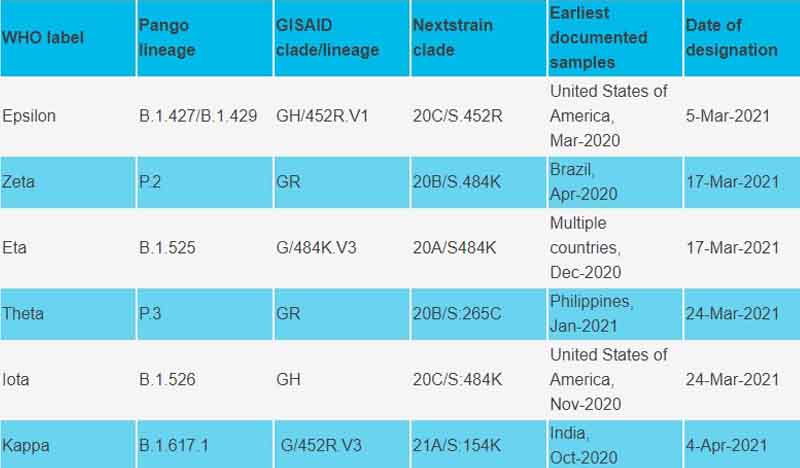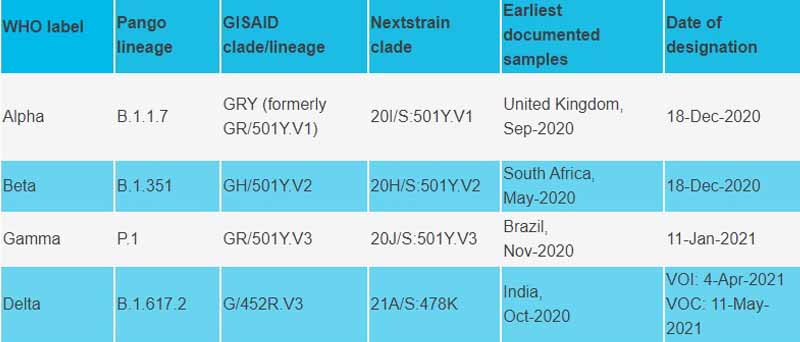- World
- Jun 01
WHO to use Greek alphabets to label coronavirus variants
The B.1.617.1 and B.1.617.2 variants of the COVID-19, first identified in India, have been named as ‘Kappa’ and ‘Delta’ respectively by the WHO as it named various variants of the coronavirus using Greek alphabets to simplify public discussions and also help remove stigma from the names.
The World Health Organisation’s move came weeks after India objected to the B.1.617 mutant of the novel coronavirus being termed an “Indian Variant” in media reports.
Coronavirus variants with alphanumeric names have now been assigned the letters of the Greek alphabet in a bid to simplify discussion and pronunciation.
The B.1.1.7 strain first detected in the UK will be known as Alpha, while the B.1.351 variant detected in South Africa is now Beta, P.1 variant first found in Brazil is Gamma and the P.2 variant is Zeta. The strains found in the US are Epsilon and Iota.
Virus variants
• All viruses, including SARS-CoV-2, the virus that causes COVID-19, change over time. Most changes have little to no impact on the virus’s properties.
• However, some changes may affect the virus’s properties, such as how easily it spreads, the associated disease severity, or the performance of vaccines, therapeutic medicines, diagnostic tools, or other public health and social measures.
• WHO, in collaboration with partners, expert networks, national authorities, institutions and researchers have been monitoring and assessing the evolution of SARS-CoV-2 since January 2020.
• During late 2020, the emergence of variants that posed an increased risk to global public health prompted the characterisation of specific Variants of Interest (VOIs) and Variants of Concern (VOCs), in order to prioritise global monitoring and research, and ultimately to inform the ongoing response to the COVID-19 pandemic.
• WHO and its international networks of experts are monitoring changes to the virus so that if significant mutations are identified, they inform countries and the public about any changes needed to react to the variant, and prevent its spread.
• Globally, systems have been established and are being strengthened to detect “signals” of potential VOIs or VOCs and assess these based on the risk posed to global public health.
Variants of Interest
• A SARS-CoV-2 isolate is a Variant of Interest (VOI) if, compared to a reference isolate, its genome has mutations with established or suspected phenotypic implications, and either:
• It has been identified to cause community transmission/multiple COVID-19 cases/clusters, or has been detected in multiple countries.
Or
• It is otherwise assessed to be a VOI by WHO in consultation with the WHO SARS-CoV-2 Virus Evolution Working Group.
Variants of Concern
• A SARS-CoV-2 variant that meets the definition of a VOI and, through a comparative assessment, has been demonstrated to be associated with one or more of the following changes at a degree of global public health significance:
• Increase in transmissibility or detrimental change in COVID-19 epidemiology.
Or
• Increase in virulence or change in clinical disease presentation.
Or
• Decrease in effectiveness of public health and social measures or available diagnostics, vaccines, therapeutics.
The need for new naming system
• Historically, viruses have often been associated with the locations from which they are thought to have emerged such as Ebola which is named after the eponymous Congolese river.
• But this can be damaging for the places and often inaccurate such as with the so-called ‘Spanish flu’ pandemic of 1918 whose origins are unknown
• The established nomenclature systems for naming and tracking SARS-CoV-2 genetic lineages by GISAID, Nextstrain and Pango will remain in use by scientists and in scientific research.
• In order to assist with public discussions of variants, the WHO convened a group of scientists from the WHO Virus Evolution Working Group, the WHO COVID-19 reference laboratory network, representatives from GISAID, Nextstrain, Pango and additional experts in virological, microbial nomenclature and communication from several countries and agencies to consider easy-to-pronounce and non-stigmatising labels for VOIs and VOCs.
• This expert group has recommended labels using letters of the Greek alphabet — Alpha, Beta, Gamma, which will be easier and more practical to discuss by non-scientific audiences.
• The WHO, while announcing the new naming system making them simple, easy to say and remember, said that it is stigmatising and discriminatory to call the variants by names of the nations they are first detected in.
• The labels do not replace existing scientific names, which convey important scientific information and will continue to be used in research.
• The new naming system aims to prevent calling COVID-19 variants by the places where they are detected, which is stigmatizing and discriminatory.
• WHO encouraged countries and others to adopt these names as they will ease public discussions about the global COVID-19 Variants of Concern and Interest.
Manorama Yearbook app is now available on Google Play Store and iOS App Store



